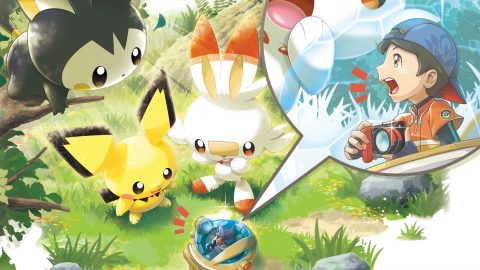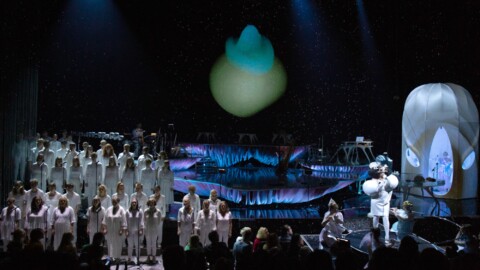
The world, as always, is dying. Beyond being a very real issue outside of our screens, it’s a conflict that rears its head in countless games – but adventure platformer Skábma – Snowfall paints it in colours you’ve likely never seen before.
In Skábma – Snowfall, your dying world is very small. Playing as Áilu, an equally small Sámi child in Northern Europe, you’re tasked with putting an end to an oozing Disorder that’s spreading across the land, inflicting a terrible disease upon man, beast and nature. In the game’s opening moments, Áilu is dropped into the role of unwitting protagonist when tragedy strikes the reindeer he’s meant to be vigilantly herding, and he’s faced with banishment by his adopted family.
Armed with a magical drum and a broken antler, Áilu sets off into Skábma‘s gorgeous world to save his home, prove his worth to his grumpy adopted father, and become a powerful Noaidis healer. It’s more responsibility than most kids have on their plate, but somehow it’s never overwhelming. Stepping into Skábma‘s lush environment feels like easing into a warm bath – the game’s atmosphere is intimately relaxing, something that’s helped by developer Red Stage Entertainment‘s choice to not besiege players with constant enemies. Likewise, it’s a visual spectacle: verdant green forests are drizzled in gentle, moted lighting, and it feels like every beaten path leads to a breath-taking vista.

There’s few conventional enemies in Skábma, which means you’re never torn from that sense of tranquillity. Instead, the game’s real enemy – ironically – is the environment itself. As a platformer, reaching your destination in Skábma often means tackling a variety of jumping puzzles. Your drum is also blessed with magical powers that can guide you to treasure and draw corruption from the Earth, which comes in handy when you reach the shrines of the Familiar Spirits – four powerful entities that will grant Áilu the powers necessary to save his family.
These upgrades will be familiar to Metroidvania fans – beyond their use in navigating the world, they’re also used to unlock new areas to explore. The first spirit’s gift – given by Skuolfi, The Owl – lets Áilu cross gaps he couldn’t previously jump across, and is needed to unlock The Bear’s power – which breaks and moulds the Earth. Each upgrade feels suitably powerful and rewarding for the work required to unlock them, and getting to go back and explore regions that were previously locked off always delivers a satisfying payoff.
Along your journey, you’ll get to know Skábma‘s small but lovely cast of characters. From Áilu’s charming young cousin Nana to Jean, a (mostly) well-meaning French researcher on a mission to observe the Sámi way of life, the game is bursting with warm personality. It’s always a delight to check in with each character as you criss-cross the world, and the writers at Red Stage Entertainment have done a fantastic job at making every conversation memorable.

Despite fierce competition, a roguish hunter called Askovis is arguably Skábma‘s greatest character. On a hunt to find a mythical man-eating Stállu, Askovis’ quest means he often crosses paths with Áilu – who believes these Stállu are nothing more than a myth. Askovis is laid-back and witty, but he’s also completely steadfast in his belief, which pushes Áilu to explore the roots of his Sámi culture – much of which he has consigned to the realm of fairy tales and campfire stories.
As Áilu reconnects with his heritage and the beliefs held by his ancestors, Skábma becomes a richer world. In one example, Áilu’s magic drum allows him to commune with a tree spirit who hasn’t talked to a human in years – which has left the spirit slightly disgruntled. This leads to an amusing conversation where Áilu requests his family knock three times before chopping down a tree, in order to give any inhabiting spirits a moment to vacate. It’s an amusing chat, but it’s more than that: it’s a brilliant device for teaching the player more about the Sámi world. From learning about humans’ several different spirits to Askovis’ reeling off horrifying tales of Stállu with suspicious glee, Skábma crafts a rich tapestry of mythology, and unrolls it in an entertaining, deceptively educational manner.
For all that it accomplishes, Skábma is hindered by some major engine and design issues. Skábma‘s terrain may look exquisite, but at times it’s incredibly difficult to navigate. Trying to jump to certain areas can feel very clunky, and Áilu was often nudged from lethal heights by uncooperative surfaces. Because Skábma is a platformer, these issues are all the more irritating: it feels awful to get sent back to the beginning of a jumping puzzle because one particular piece of rock decided to violently repel you mid-jump, and the game’s scenic vistas lose some of their beauty when you’re inexplicably sent tumbling off them.

Taking a particularly bad tumble – caused by bungle or bug – can drop Áilu’s health perilously low, which causes an indecipherable purple filter to settle over the screen. This means that when you need to be at your most carful, you can barely see where you’re walking, as if the heavy-handed visual effect is trying to finish the job that gravity started.
The last bit of criticism is less of an outright issue, and more of a divisive design choice. Skábma has no map system in place, meaning you’ll have to rely on a mix of intuition and blind guessing to work out how to get to your next destination. Trying to keep track of which paths you’ve followed and which you haven’t can be very confusing, especially when you’ll often come up against blockers that require powers you don’t have available to go through. The lack of direction will tick the right boxes for players looking for no-punches-pulled adventure, but it’s just as likely to leave others feeling frustrated.
Optimistically, these are all issues that could be addressed further down the line. While the inconsistent terrain is a major concern, it’s not quite enough to warrant casting Skábma in too harsh a light.
Skábma – Snowfall has launched today (April 22) and is available to pick up on PC.
The Verdict
Taken with a grain of patience, Skábma is a warm and wonderful coming-of-age story with a refreshing change of scenery. The game’s platforming is held back by some major bugs, but captivating storytelling and gorgeous graphics ensure it’s easily worth the £14 price tag.
Pros
- Pristine lighting and plenty of breath-taking sights make Skábma very easy on the eyes
- The game’s Sámi setting is wonderful
- It’s hard not to fall in love with Skábma‘s cast
- Lots of very cute reindeer
Cons
- Clunky terrain makes platforming highly frustrating at times
- The lack of any mapping feature won’t work for everyone
- Playing with low health is nearly impossible due to an overbearing visual effect
The post ‘Skábma – Snowfall’ review – a creative coming-of-age fairy tale appeared first on NME.










